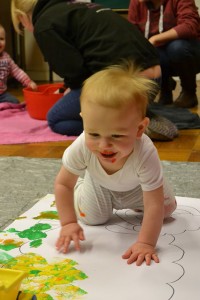Children are quite hands on with new things, this is how they learn. Taking part in ‘messy play’ is just another aspect of a fun, healthy and productive childhood. When a child gets ‘messy’ it doesn’t necessarily mean that they are rolling about in the dirt or splashing around in muddy puddles, it simply refers to activities that are considered slightly more messy such as art and craft activities like finger painting and making things out of play dough etc. Many parents try to avoid their childen getting mess on themselves or around the house, but by doing this they are stopping the natural development of their child’s mind, forcing them to restrain from enjoying activities that all children naturally adore. Here are a few ways in which messy play has a positive reinforcement on children’s learning:
Unleash their Creativity
Enhance their creative minds by giving them artistic tools to enjoy, such as paint brushes, craft sticks, coloured felt, stickers, sponges and crayons from a store that has everything in one place, such as Home Crafts. Although finger painting is quite a messy activity, children will love the feeling of the paint and enjoy creating wonderful pictures, allowing them to depict various images that they have seen in the world. They could also use play dough and feel it squishing in their hands, another great activity for kids to help them hone their creative skills. Who knows, you may uncover a mini artist living right under your roof.
Intellectual Development
By getting quite ‘hands on’ with playtime, children develop their intelligence because they are constantly exploring new things, helping to develop a clearer understanding of their surroundings. According to Our Hands on Learning, this increases intellectual development because as children continue to “observe, predict, try out solutions, observe the results, and evaluate information” they will eventually gain a greater understanding of the world around them and learn how to group, classify, identify and match.

Increase Motor and Coordination Skills
When children are playing with various tools and engaging in activities such as stacking or pouring, they will be able to better develop their hand-eye coordination. If your child never gets to play like this, they will not develop or learn as quickly as a child who was able to experience all of these things from a very young age. Children will be able to better develop fine motor skills by practicing with simple cutting techniques and comparing various textures along the way. Messy play allows kids to get creative and learn new skills that will help them later in life.
Personal and Emotional Development
Children are curious creatures and according to Natural Child Magazine, play that “incorporates rich textural experiences” enable children to better express their emotions through “manipulating the materials (clay, paint, sand) and refines their sense of touch”. Concentration levels increase during messy play as well as planning and problem-solving development. When a child experiences messy play with other children, it helps them to gain respect for not only themselves but for others as well, enhancing their social and emotional skills at the same time.

